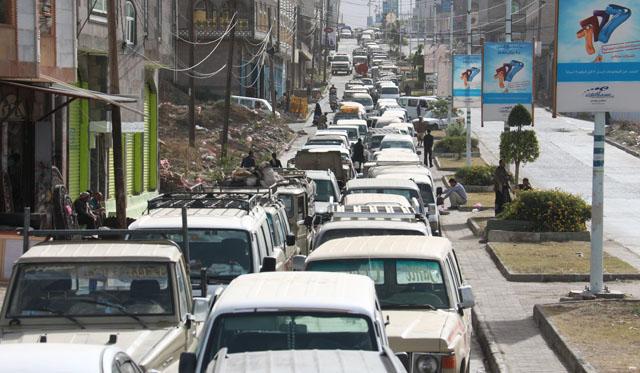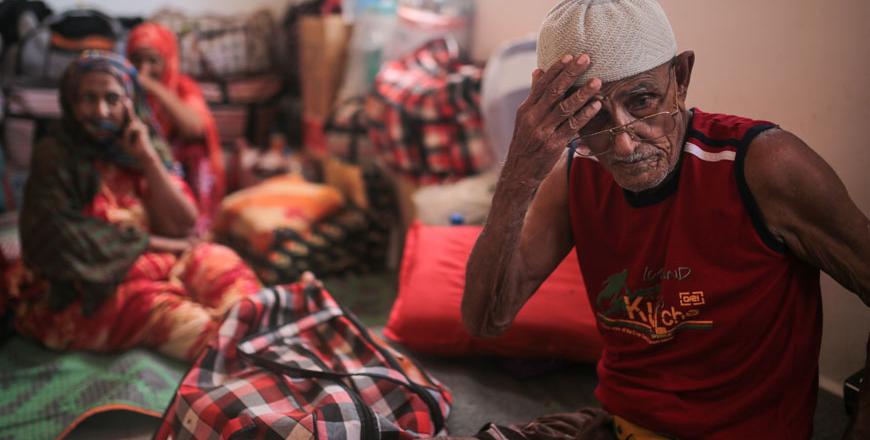You are here
Unwilling to risk vessels, shipping lines pull back from Yemen
By Reuters - Apr 09,2015 - Last updated at Apr 09,2015

LONDON — International shipping lines are being forced to scale back or suspend port calls to Yemen as the conflict gets worse, putting pressure on supplies of food as prices rise in local markets.
Yemen imports more than 90 per cent of its food, including most of its wheat and all its rice, to feed a population of 25 million. Much of its needs had been serviced by foreign ships.
Saudi Arabia and Arab allies have launched air strikes against the Iran-allied Houthi movement, which has taken most of the country and forced President Abd-Rabbu Mansour Hadi to flee to Riyadh.
The coalition has deployed naval vessels to intercept ships carrying arms to the rebels, although merchant ships are meant to have free passage.
Most ports appear to be under Houthi control or are disputed by combatants. Many shipping companies are now unwilling to risk their vessels, industry sources say.
"Many of the owners and container lines are refusing to go to Yemen. You can still call at a number of ports but the fear factor is growing," an international commodities trade source involved in Yemen indicated.
The world's largest global shipping association, BIMCO, said: "If a port is taken/held by the Houthis and a ship is seen to be supplying the rebels, the ship could be at risk from air strikes or indeed naval action from the coalition."
Another commodities trader said his vessel carrying wheat was held up for days by coalition ships before being allowed through into Yemen. The impact is being felt by local people in the Arab world's poorest country.
"The price of a 50-kilogramme bag of wheat has risen from 5,000 Yemen riyals ($23) to 6,300 riyals," indicated Muhammad Saad, 37, from the capital Sanaa, which is under Houthi control. "People are buying wheat in big quantities because they fear shortages."
Fahd Al Dhabhani, a government employee from Sanaa added: "We are living a disaster from all sides. The price of wheat and flour have risen in a big way. There is no more petrol even on the black market."
Port calls
The world's top container group, Maersk Line, said it had suspended all calls to Yemen.
The world's number 2 ship container line, MSC, said it had taken the decision to divert vessels bound for Yemen "to alternative, and more secure, ports in the region".
The world's third biggest container group, CMA CGM said separately it was not making direct port calls to Yemen, only booking slots on other vessels that still called at the Port of Hodaida.
Others such as Taiwan's Evergreen Line had also suspended shipping services "to prevent risk to the Line's vessels and its customers' cargoes".
The processing and distribution of wheat and other staples have already been disrupted. Aid agencies have warned that Aden faces a humanitarian catastrophe.
"The port of Aden is virtually closed, but for some oil shipments which berthed at Aden Refinery. Dry cargo shipments have been stopped because no stevedores are available due to armed clashes," shipping and logistics agency GAC said.
GAC remarked that other ports such as Saleef, and Hodaida on the Red Sea remained open.
Nevertheless, an explosion at a dairy factory at Hodaida was adding to the risks. In another blow, Al Qaeda in the Arabian Peninsula captured the eastern port of Mukalla last week.
Container group United Arab Shipping Company said it had suspended all cargo bookings. Precious Shipping, one of Thailand's largest dry cargo ship owner, said it would not allow any of its fleet into Yemeni waters.
At least four oil and natural gas tankers that were headed to Yemen have been diverted due to the chaos.
So far, there have not been any major disruptions to the Bab Al Mandeb waterway off Yemen through which nearly 4 million barrels of oil are shipped daily to Europe, the United States and Asia.
Iran sent two warships to the Gulf of Aden this week to protect Iranian shipping. Iran's Supreme Leader Ayatollah Ali Khamenei said air strikes by the Saudi-led coalition amounted to "genocide".
"Iran's warships are not likely going to initiate any hostilities, but could serve to run interference with warships of other navies that might attempt to prevent Houthi rebels onshore from resupplying," said Michael Frodl, of US based consultancy C-Level Global Risks.
Separately, APR Energy Plc. said it had ceased operations in Yemen due to escalating conflict in the country, the second setback for the company in the Middle East in the last few months.
Shares in the company were down as much as 5 per cent in early trading on the London Stock Exchange.
APR Energy, which rents out turbines and generators to overcome power shortages, said it had taken the decision after "much careful consideration" and following a "detailed assessment of the well-publicised conflict in the country".
Jacksonville, Florida-based APR's focus on emerging markets has left it exposed to political risk in countries such as Yemen, where it has been operating since 2012.
The Middle East accounted for 12 per cent of the company's contracted capacity and 7 per cent of group revenue, according to the company's 2013 annual report.
APR Energy suspended power generation in Libya last November and said in January that it would move its assets out of the country as the government there failed to ratify its contract.
The company warned last month that it expected 2014 net income to be significantly below current market expectations.
APR Energy also said on Thursday that it had received a notice from a customer in the South Pacific for early termination of a 60 megawatt contract.
The contract will now end in the third quarter of this year, three months ahead of its original termination date. It did not name the customer.
Related Articles
At least five merchant vessels carrying food are stuck off Yemen, shipping data showed on Wednesday, as warships from a Saudi-led coalition search them for weapons bound for Iran-allied Houthi rebel forces, with delays adding to a humanitarian crisis.
LONDON — A trickle of aid, medicine and commercial food cargoes is reaching Yemen yet the process remains slow as more ships await clearance
A week into Saudi-led air strikes in Yemen, food imports into the Arab world's poorest country are grinding to a halt as the conflict puts fragile supply chains under growing strain and commercial suppliers stay away.
















